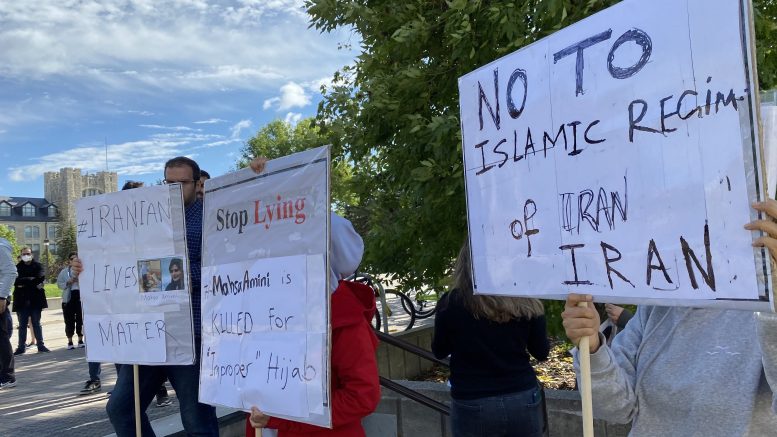Students protested the death of Mahsa Amini outside University Centre on Sept. 20. After being arrested by Iran’s morality police over how she was wearing her hijab, Amini died in police custody.
Protests quickly erupted in Iran and across the world after Amini’s death was reported.
Iran is a country with a history of violently cracking down on its citizens, and it has been reported that more than 30 people have been killed as a result of the current protests, with hundreds more arrested and injured. The government has also cut off access to the internet in certain places, severely limiting communication inside and outside the country. In 2019, hundreds of people were killed protesting the government’s decision to raise fuel prices as high as 300 per cent overnight, as well as high inflation and unemployment rates.
An Iranian student at the U of M who requested that they remain anonymous said that they took part in the campus protest to show support for family and friends still living in Iran, and also to raise awareness on campus. They chose to speak out anonymously so that they would not endanger family and friends in Iran.
“I believe that [in] these times, people need to support each other,” they said.
The student said that due to the Iranian government cutting the internet, they have been having difficulty communicating with relatives. However, the news has shown them that the situation in Iran is dire.
“People don’t want these mandatory rules,” they said.
“What we hear from our friends and families is that it’s like a war in there. People are trying to show that they are unhappy, but police [are] shooting them, beating them.”
Thirteen years ago was the first time the student remembered Iranian protesters being attacked by the government, but they stated that this has been going on since the 1979 Iranian revolution.
The student explained that the morality police, a unit that enforces strict dress code laws influenced by the government’s interpretation of Sharia, often drive around in large vans and attempt to lure women into speaking with them. The student said that after questioning, the police often assault citizens while spewing derogatory and abusive rhetoric towards them. Women are expected to cover their hair and wear long, loose-fitting clothing.
The student emphasized that even if women obey the dress code laws, they may still be attacked. They said that since there is no codified dress law with specific requirements, officers use their discretion to dole out punishment as they see fit, which often leads to unwarranted arrests and beatings.
They said that they feel conditioned to fear the morality police. Upon first coming to Canada to study at the U of M, the sight of a large van or black car would still stress them out despite being thousands of kilometres away from Iran.
The Iranian student alleged that when University of Manitoba president Michael Bennaroch was asked to issue a general statement to students and staff acknowledging the violence in Iran, he did not meet this request. The student said the U of M also failed to acknowledge the violence in 2019.
The student said that with the internet down, Iranian students who rely on tuition support from their families may be unable to receive the funds necessary to pay their bills and student fees. They alleged that when these concerns were raised with Benarroch, the only response they received was a referral to the tuition fees page.
“It made me feel alone,” the student said.
“I know that most of these students are distressed, they can’t concentrate. I couldn’t do anything this week”
“All I want to do is to get a chance to find the connection for my friends and see that they are alive. I don’t expect any human beings to feel like that. I’m happy that most of the population of the world don’t know how that feels, but the least you can do is to, as a president or as someone that has international students in their community, to do something to acknowledge that pain or distress.”
A 2021 U of M census showed that Iranian students make up the largest demographic of students from the Middle East, and the seventh highest by citizenship at the U of M.
When asked for comment, U of M spokesperson Myrrhanda Novak issued a statement Monday afternoon.
Novak pointed to the U of M Emergency Bursary Fund as a resource for students to help cover tuition and living expenses.
They also highlighted a post from the @umstudent Instagram page acknowledging the “unjust and deeply troubling situation taking place in Iran.” The message was posted the same day as the interview with the anonymous Iranian student.
Novak said that a message from the provost’s office was sent to all deans, asking them to tell instructors and sessionals who are supervising or teaching a student impacted by the current situation in Iran to exercise compassion.
“The University of Manitoba condemns the tragic and unjust death of Mahsa Amini while in police custody and is committed to support impacted students during this challenging time,” they said in an email statement.
“The university’s vice-provost (students) has responded directly to student comments and concerns including sharing available resources and supports.”
Novak also pointed to a gathering hosted by the Spiritual Care, which will “offer a safe space for sharing and support” this Thursday from 4:30 p.m. to 6 p.m.
The anonymous student hopes that the protests can lead to Iran becoming a safer place for people of any religion. In the future, they wish to see Iran become a country that respects all people’s thoughts, beliefs and choice of clothing.
“We would love to see that we are having a government that respects all of human rights.”


